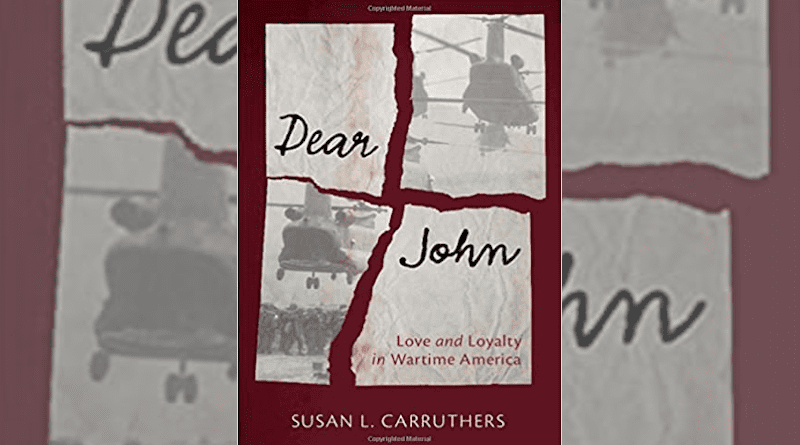‘Dear John’: New Book Reveals Untold Story Of Wartime Break-Up Letter
“Mail and morale march in lockstep,” writes Professor Susan L Carruthers in the introduction to her new book, Dear John: Love and Loyalty in Wartime America. Writing letters to a spouse or sweetheart deployed overseas was portrayed as a patriotic duty, a means to boost the morale of the fighting man. Agony aunts and military chaplains gave stern advice on topics to avoid in order that the soldier not be distracted from his – for it was almost always his – professional duties.
But what of the letter that broke off an engagement, or announced the intention to file for divorce? During World War II such letters became known as “Dear Johns,” and the women who sent them denounced as traitors, a “fifth column,” deserving to be shot at dawn.
In Dear John historian Susan L. Carruthers details the history of the “Dear John” letter and explores wartime relationships and breakdowns from multiple perspectives—civilian and military, male and female, historical and contemporary. Using a broad range of research and sources, including personal letters, declassified documents, press reports, psychiatric literature, movies, and popular music, Carruthers also shows how the armed forces and civilian society have attempted to weaponize romantic love in pursuit of martial ends, from World War II through Korea and Vietnam to today’s “forever wars” in the Middle East.
Professor Carruthers highlights the expectations placed on women to do the emotional labour of sustaining intimacy across miles and years of absence, and challenges the allocation of blame when some of those relationships broke down.
She said: “I’d like readers to come away with a more textured appreciation of how hard it is to stay connected in a healthy, happy, mutually satisfying romantic relationship where one or both parties are deployed far from home, in situations that involve severe danger.
“There is so much complexity here and we owe it to those women who have written letters – whether to sustain relationships or end them – to appreciate how hard that is, across all of these conflicts and through all the changes in technology.”
Incorporating vivid personal experiences in lively and engaging prose—variously tragic, comic, and everything in between—this compelling study brings wartime relationships to a new audience.
Topics covered in Dear John include:
Who “wrote” the Dear John?: Most of what we know about Dear Johns comes from what men have had to say about women’s break-up notes. In a very real sense, it’s true to say that men invented the “Dear John” and authored apocryphal specimens in hugely different styles. Rather than seeing the “Dear John” as a female epistolary genre, we should think of it more as a male oral tradition. So, although Dear John is about women’s letter-writing, it’s also very much about men’s story-telling.
New media: DEAR JOHN explores the role of constantly changing technologies in both facilitating intimacy and undermining it in wartime. Has the digital era made it harder or easier to endure separation caused by deployment? And how persuasive is the widely shared view that bad news cuts deeper the faster it arrives—that an electronic Dear John is more damaging than one delivered by mail?
Breakups and breakdowns: The connection between the failure of intimate relationships (particularly as heralded by “Dear John” letters) and suicide has repeatedly surfaced in the news—and in military studies—over the past decade. DEAR JOHN challenges received wisdom on this topic, arguing that we need to better understand the pressures on intimate relationships caused by war and preparation for deployment, rather than blaming women for severing romantic ties.
Professor Carruthers added, “Making romantic intimacy serve the cause of victory has never been straightforward for the military. Nor has making love work in wartime been simple for individuals and couples. The reasons why can be discerned by reading the subtexts and contexts of ‘Dear John’ letters, and by listening attentively to what men and women have had to say about the fragility of love at war.”

